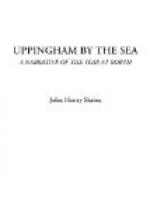CHAPTER VI.—MAKESHIFTS.
[Greek text].
From our chapter on the geographical features of our settlement we pass on to describe how the settlers were housed and organised.
If a school be an institution for teaching purposes, its school-room and class-rooms should be the most essential portion of its plant. Without discussing the adequacy of the definition, we will begin with these. We were not ill provided; with an exception or two, the rooms appropriated for class-rooms answered the purpose well. Some of them were spacious; the rest were large enough for the wants of the classes, limited to an average of twenty. Nor would a Government Inspector have justly measured this adequacy by the “cubic capacity,” if he failed to take into account the exhilarating five minutes’ breathing time upon the beach, at eleven o’clock. There was a rare pleasure in those moments of escape from Greek verbs to the sparkle of the tide and the scent of the sea breeze.
What Germans call the “real” subjects, were also provided for. The modern languages were taught mostly in the class-rooms of the classical masters. Music took up her quarters in several scattered dwellings. Wales is the home of song, and our musicians were very welcome to make the cottage walls resound to violin or key-board. We remember well the affectionate reverence with which one aged custodian spoke of the “pianass” she was proud to house; she cherished them as if they had been tame elephants. Several concerts were given during our stay—but in the Assembly Rooms of Aberystwith; our wooden school-room was found, on the first experiment, unfit for the purpose, from the want of resonance. The makeshift gymnasium and carpentery, in the stables and coach-house, have been mentioned before. If among “real studies” we may include the cricket, this was, as we saw, well cared for; while the instructor in swimming had nothing to complain of, with four miles of good beach, and the Irish Channel before him.




